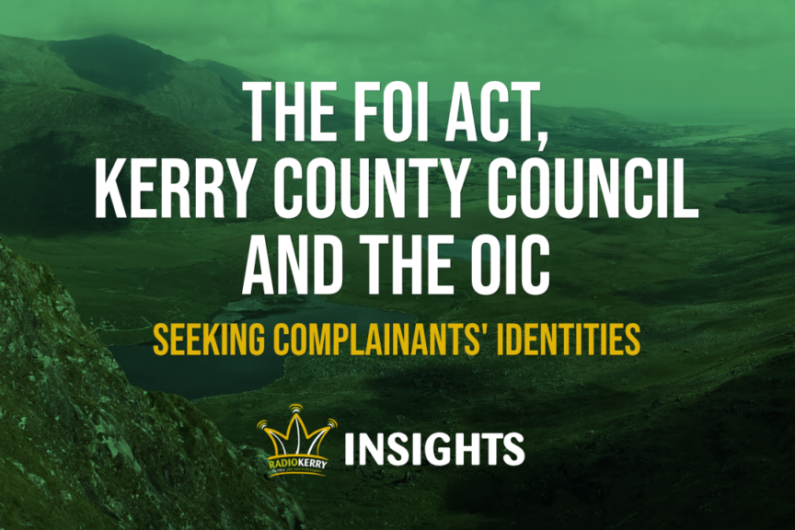A number of people have sought information from Kerry County Council about the identities of those who’ve lodged complaints against their property. This is shown in decisions published by the Office of the Information Commissioner over the past number of years. The Office of the Information Commissioner, or OIC, carries out independent reviews of decisions taken by public bodies on Freedom of Information requests. Can you give some background on this?
This all stems from something listeners may have heard mentioned here on Radio Kerry or by journalists in other media. It’s the Freedom of Information Act.
The FOI Act says that people have:
- the right to access official records held by government departments or public bodies
- the right to have personal information held on them corrected or updated where such information is incomplete, incorrect or misleading
- the right to be given reasons for decisions taken by public bodies that affect them.
These rights mean that people can seek access to personal information held on them no matter when the information was created. When a member of the public seeks information from a department or public body, a number of timelines and procedures must be taken into account. In general, the information requested should be given within a four-week period or – in the case of a time extension – given within eight weeks. If someone isn’t happy with the information they receive, they can appeal it, which means a person in a more senior position reviews the request and the information provided.
There are a number of restrictions on what can be requested through the FOI Act. For example, information which might identity people unrelated to the query or be commercially sensitive is not released. What if someone isn’t happy with the information given in the original request or following the results of the review?
The next step is to take the case to the Office of the Information Commissioner – or the OIC. This body hears appeals from members of the public who are not happy with decisions made on their requests. It is an independent appeals body, which has the power to affirm, vary or annul a public body's decision and make a new decision. When it begins to review a decision by a public body, it examines the information supplied and invites submissions from the parties involved. The parties are usually the applicant and the public body.
In recent years, a number of FOI Act requests to Kerry County Council have been appealed to the Office of the Information Commissioner. In particular, a number related to complaints around a person’s property, hedges or planning permission. Can you outline a few?
This first one relates to a complaint about overgrown hedges. In December 2019, a woman and her husband contacted the council after they received a hedge cutting advisory notice. They were informed that the hedge/trees on their property were causing damage to vehicles. In January 2020, they submitted a request to the council under the FOI Act for details of whose vehicles were damaged and who made the accusations. The council confirmed it had received a complaint, but refused access to the complainant’s identity as they said the information was given in confidence. The woman sought an internal review, wanting to know who had sent in the report and when, and who inspected their property and when. The council said the complaint was made in November and in December a member of staff inspected the hedges and confirmed they needed to be cut. The woman whose hedges were complained contacted the OIC and claimed she was entitled to know who had made the allegations.
What did the OIC do in this instance? And what were the findings?
The OIC had to decide if the council was correct to not release the complainant’s identity to the woman. In the end, the OIC sided with the council, saying the FOI Act doesn’t apply to a record which could identify someone who gave information in confidence in relation to the enforcement or administration of the law.
That was in relation to hedge cutting. Another case was taken to the OIC by someone in Kerry in relation to complaints about a property. Can you give the background?
This one also began in 2019. This applicant was represented by her solicitors from the outset. In June 2019, the applicant sought a copy of the entire file held by the council’s Environmental Section in relation to their property arising from a complaint made. A month later, the council released some information, but withheld or redacted parts. The applicant sought a review, which added nothing more to the information released.
Again, this one related to finding out the identity of someone who made a complaint. What decision did the OIC come to?
The council relied on a particular section (Section 42 of the act) of the act. This section protects the identities of people who have given information in confidence in relation to the enforcement or administration of the law. This is to ensure that members of the public are not discouraged from co-operating with public bodies or agencies.
I understand this complainant, through her solicitor, claimed she was entitled to the information. What argument was put forward?
The applicant contended she was entitled to know who had made the complaint, and added there was no evidence that the complainant(s) had requested such confidentiality from the council. She also argued that the complaint was false and without foundation. However, the council said that enforcement of the environmental legislation was reliant on the guarantee that members of the public would not have their identity revealed to the person who was the subject of the complaint. On the argument that the complaint was false and without foundation, the OIC said that bodies such as the council act upon every report as if they’re given in good faith, even where the evidence suggests that the complaint was maliciously motivated.
Again, the OIC affirmed the council’s decision and refused access.
There were more cases taken to the OIC in recent years in relation to getting the identities of people who made complaints. Can you give a run through of a few of these?
In 2018, an applicant sought access to records held by the council concerning planning enforcement complaints. In this case, two people had made complaints about a development. The council released some information, but none relating to the people who had made the complaints. The applicants also queried the accuracy of certain records released by the council. Interestingly, the OIC wrote to the complainants in this case, asking if it’s okay to release their identities. One said no problem, but the other didn’t reply. The details of the person who didn’t reply was treated as them effectively not giving permission to release their details. In the end, the OIC ordered the release of some further information, but redacted complainants’ details.
These are just a number of appeals taken to the OIC in recent years.
Yes, and it could be noted that this can be thought of as step three of four. The first being the FOI Act request, the second being the internal review, the OIC being the third and the fourth being a High Court challenge. It’s entirely possible that many requests for the identities of people who’ve complained about hedges, planning, environmental issues, etc. were received by the council through the FOI Act but were never pursued. Being somewhat familiar with the FOI Act, and now adding the outcome of these OIC reviews, I can’t see how the council would ever be forced to reveal complainants’ identities.
Eamonn Hickson - July 2021








